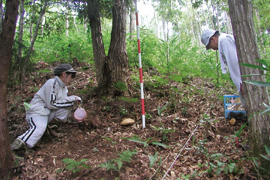The Mitsui & Co. Environment Fund
Introduction to Grant Projects
The Japan Kinoko Research Center Foundation
Woodland conservation and regeneration using mycorrhizal mushrooms
Activity grant
- Project Description
Research and analysis aiming to develop techniques to regenerate and conserve deteriorating wooded 'mushroom mountains'. Trees in the pine and beech families, such as Japanese red pine, sawtooth oak, and quercus serrata, are commonly found in woodland close to inhabitated areas and have roots with mycorrhizal properties which enable mushrooms to grow symbiotically with the tree. Notable examples are matsutake and lyophyllum shimeji mushrooms. Although there are a wide variety of mycorrhizal mushroom species, they are disappearing from these woodland environments due to a deterioration in light conditions caused by mismanagement. Action is needed to improve the environment within these woodlands, but at present we do not have the technical knowledge required. This project aims to research the growth of these mushrooms and contributing factors through various studies in areas around Tottori city.
- Fields
- Preservation of surface soil and forestsPreservation of biodiversity and ecosystem
- Grant year
- FY2007 Activity Grants
- Grant term
- 3 years
July 2007 - June 2010
- Grant amount
- 9,180,000 yen
- Activity region
- Tottori Prefecture, Japan

Overview of the Organization

- Representative
- Hirotaka Tsuneda, Director
- Establishment
- 1958
- Establishment purpose
- The Japan Kinoko Research Center Foundation has its roots in the National Shiitake Promotion Association which was established in 1947 with the aim of promoting the raw wood cultivation of shiitake mushrooms across Japan, having dried shiitake replace silk as the nation's representative product, and contributing to the rebuilding of the country by developing the forests and mountain villages devastated by the Second World War. In 1958 it became a foundation with the aim of contributing to the robust development of Japan's forests and mountain villages and improving the health of its people by researching, promoting, and educating on mushrooms and fungi, as well as contributing to the improvement of academic culture.
- Main area of activity
- Japan
- Staff
- 13 full-time staff, 9 part-time staff
- Annual operating budget
- 144 million yen in 2005, 133 million yen in 2006, 142 million yen in 2007
- WEB site
- http://www.kinokonet.com/
- Recent activities
- We are conducting the following activities with the aim of acheiving the founding principle of our foundation which is 'contributing to the preservation and promotion of environmentally-friendly, recycling-orientated farming and forestry enterprises and the development and improvement of academic culture': various research, development and technical instruction initiatives relating to the raw wood cultivation of useful mushroom species that occur in natural cycles, such as shiitake, in order to contribute to the recovery and development of mountainous areas that are deeply linked to the conservation and use of forest resources; fungi research focused on mushrooms, and education and research guidance in order to improve academic culture; and the cultivation of human resources with the skills and knowledge to undertake work from an ecological and environmental perspective.